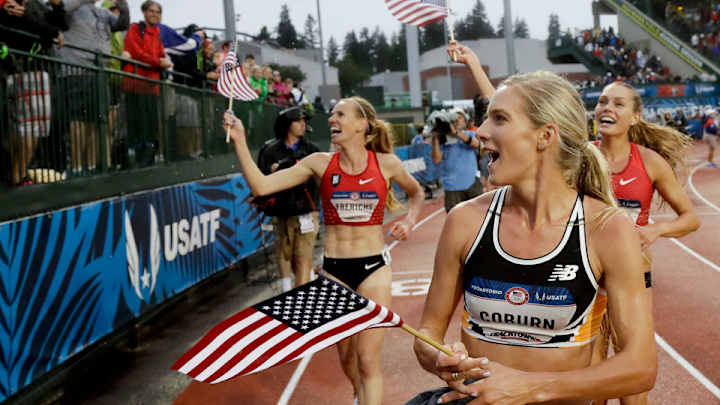Watch: Emma Coburn heads to Rio after dominating trials victory

Your teams. Your favorite writers. Wherever you want them. Personalize SI with our new App. Install on iOS or Android.
EUGENE, Ore. - Emma Coburn made her second U.S. Olympic Trials crown look easy as she won the women’s 3,000 meter steeplechase Thursday in 9:17.48.
In 2012, Coburn qualified for the Olympics as a junior at Colorado and went on to finish ninth at the Olympics in London. She matched her training partner Jenny Simpson’s place from the 2008 Summer Games in Beijing, which was when the event was first added to the Olympic program for women.
Since the London games, Coburn has run faster than Simpson’s American record on two occasions. She initially claimed the record with a 9:11.42 run at the Glasgow Diamond League meet in July 2014 but failed to undergo a drug test within 24 hours of the race, which is a requirement for USA Track & Field to ratify a new American record. The record was not be ratified and she oddly held onto a personal best faster than Simpson’s time.
• Usain Bolt’s hamstring injury could change landscape of Rio Olympics
That all changed at June’s Prefontaine Classic, on the same track as Thursday’s win. Coburn ran 9:10.76 to finish third behind Burundi’s Ruth Jebet and Kenya’s Hyvin Jepkemoi, whose 8:59.97 and 9:00.01 are the second and third fastest of alltime. Coburn appeared ecstatic after her race to undergo drug-testing to finally make her national record official.
While Coburn slightly trailed behind the winners, she is in contention to deliver the United States’ first Olympic medal in the event. Last summer, she finished fifth at the world championships and at the moment holds the third fastest time in the world for 2016.
Joining Coburn in Rio de Janeiro will be NCAA champion Courtney Frerichs and former NCAA champion Colleen Quigley. Frerichs and Quigley made their move coming off the final water barrier with less than 200 meters remaining and they passed Stephanie Garcia, a finalist at last summer's world championships in Beijing. Garcia also clipped the final barrier and faded to fifth place.
Watch the final lap of the women's steeplechase final below:
.@EmmaJCoburn, you're going to Rio! #RoadToRio https://t.co/OR9twrK6T2
— NBC Olympics & Paralympics (@NBCOlympics) July 8, 2016
Frerichs' 9:20.92 and Quigley's 9:21.29 were personal bests.
Women’s 100-meter hurdles with no unexpected early exits
The United States has the deepest women’s hurdle corps in the world. Finishing within the top three to advance to Rio may be tougher than winning gold at the Olympics as nine of the top 10 women in the world were in the first round. All of them safely advanced to the next round.
Brianna Rollins, the 2013 world champion and former American record holder, clocked the fastest time with a 12.56-second run in the last section. American record holder Keni Harrison's 12.57 was the next fastest of the afternoon.
Queen Harrison's 12.72 from early June was the 10th fastest time in the world in 2016. Five women ran wind-legal times faster than that on Thursday.
• Nike unveils new track spikes, color palette for Rio
Men’s 1,500 meter qualifiers
In order to qualify for the Olympics, an athlete must be among the top three finishers with the Olympic qualifying standard of 3:36.20 or faster. Only five of the 30 U.S. men entered in the 1,500 had the mark coming into Eugene and after the first round nothing changed—just Robby Andrews, Ben Blankenship, Matthew Centrowitz, Leo Manzano and Kyle Merber have the standard.
Andrews, last year's U.S. championship runner-up, said he has prepared for any type of race in practice. Just four years ago, he missed out on the third spot to London by .77 seconds.
"I'll race anyone who wants to race," Andrews says. “If Matthew [Centrowitz] wants to go with 600 out that's fine. If they want to make it a 3:34 race, that's fine. If they make it a 2:11 race, that's fine too.”
Andrew Wheating, a 2012 U.S. Olympian at 1,500, is among those without the standard and has given up on focusing on time and will simply focus on winning the races ahead.
"I've kind of come to peace with the fact that I could not make this team. It took forever for me to accept that I may not be going to Rio but in so doing, it's taken a whole load of stress off my shoulders. For me, if I'm first, second or third, I'm not going but at least I threw a curve ball at the guys with the standard."
A bright future in the men's 200 meters
Although the times were wind-aided (a wind reading above 2.0 m/s does not count for world-leading times or records), the two fastest performances of the day came from high school sprinters. Florida commit Noah Lyles ran the fastest time of the day, as he won the first section in 20.04. Michael Norman of Vista Murrieta High School in Murrieta, California posted the second fastest time of the day as he ran 20.06 in the penultimate heat.
Seasoned veterans Justin Gatlin, Tyson Gay, Ameer Webb and 2013 400 meter world champion LaShawn Merritt also advanced.
The men's 200 meter semifinals will be held on Friday night with the final on Sunday.
• Meet the track and field athletes representing the U.S. in Rio
Sydney McLaughlin composed ahead of Olympic semifinal
Sydney McLaughlin, a junior at Union Catholic in New Jersey, advanced to the 400-meter hurdle semifinal as she won her respective heat in 55.46 seconds. The time is the fifth fastest by a high school runner.
McLaughlin could become the youngest member of the 2016 U.S. Olympic track team at just 16 years old. She turns 17 on August 7th, two days after the Opening Ceremonies in Rio.
"There's so many people here,” McLaughlin says. “I have never been in front of a crowd this big. It definitely has an effect. I was a little worried about the rain—[Worried about slipping] and my hair. I got it done yesterday.”
Shamier Little, the two-time NCAA champion from Texas A&M and 2015 world championship silver medalist, inked a professional contract with Adidas on Wednesday and was among those that advanced to the semifinal.
• Montaño, Martinez collision in 800 meters was unfortunate, but result was fair
Women’s 1,500 meter surprises
Three sections of the women's 1,500 were run to eliminate just three of 27 runners. A fall in the first heat by former Georgetown Hoya Rachel Schneider put her chances of advancing in jeopardy but a slow second race resulted in two other runners with slower times. Schneider advanced but Sarah Brown, a professional runner for New Balance, was eliminated less than four months after giving birth to her daughter Abigail.
